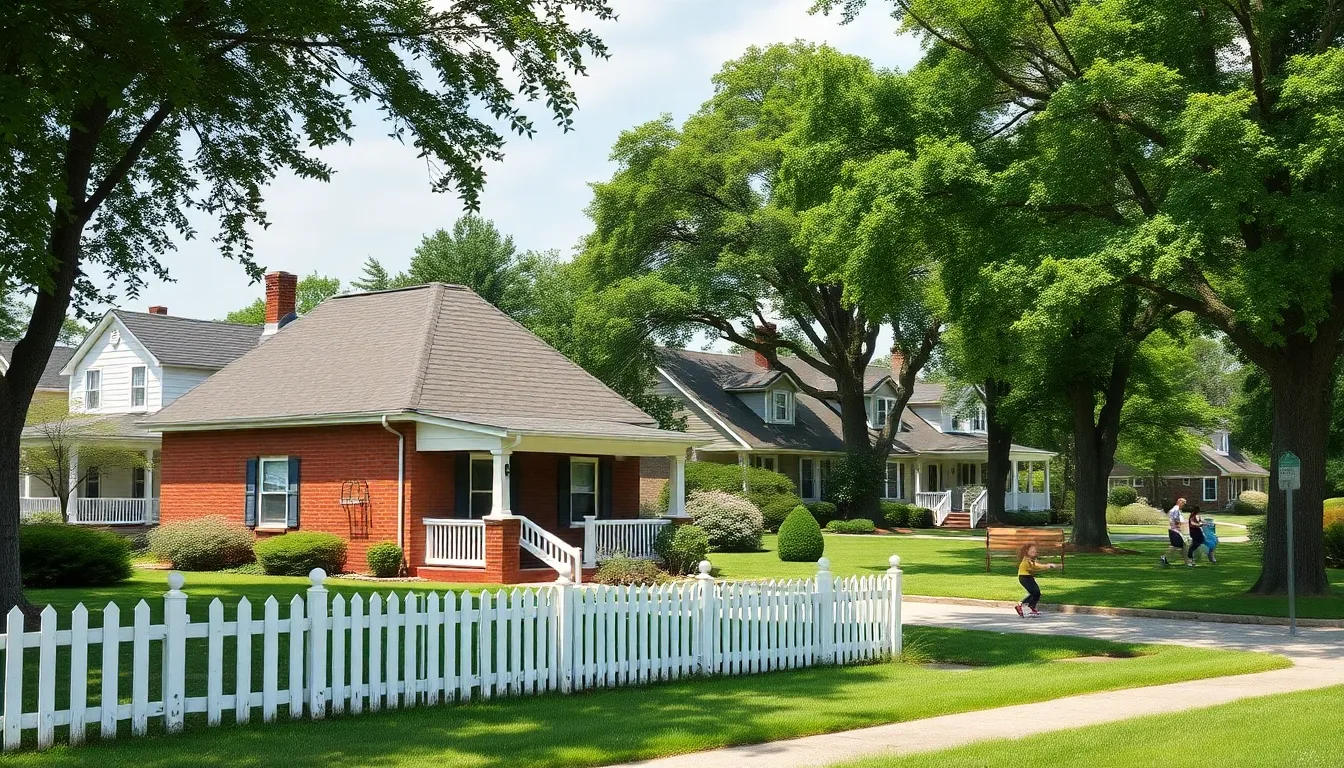Table of Contents
ToggleNavigating the world of homeownership can feel like stepping into a labyrinth, especially when it comes to understanding HOA fees and property taxes. One might wonder if they’re paying for a pool party or funding the local school’s latest science project. Spoiler alert: it’s usually a bit of both!
While HOA fees promise pristine lawns and a neighborhood that looks like it’s straight out of a magazine, property taxes are the backbone of community services. Each has its own quirks and costs, and homeowners often find themselves caught in the crossfire. So, which one deserves more of your hard-earned cash? Buckle up as we dive into the delightful debate of HOA fees versus property taxes, helping you make sense of where your money really goes.
Understanding HOA Fees
Homeowners Associations (HOAs) charge fees to maintain community standards and services. These fees cover various aspects of community management and property upkeep.
What Are HOA Fees?
HOA fees consist of monthly or annual payments. Communities determine these fees based on shared amenities and services. Typical expenses include landscaping, pool maintenance, and security. Homeowners benefit from a well-maintained neighborhood and access to recreational facilities. Fees may vary significantly between communities, often reflecting the level of services provided.
Benefits of HOA Fees
HOA fees support numerous advantages for residents. They ensure consistent property upkeep, enhancing property values over time. Access to community amenities like parks and clubhouses enriches homeowners’ lifestyles. Regular maintenance ensures that common areas remain safe and appealing. Additionally, HOAs enforce rules that help maintain aesthetic standards, promoting a harmonious neighborhood environment.
Understanding Property Tax
Property tax serves as a crucial funding mechanism for local governments and is based on the assessed value of real estate. Homeowners face property taxes that vary by jurisdiction, which impacts the specific calculations of each property’s tax liability.
What Is Property Tax?
Property tax refers to an annual levy imposed on real estate properties. Governments assess the market value of properties and determine taxes based on percentages set by local tax authorities. Residential properties typically incur tax rates ranging from 0.25% to 2.5% of the assessed value. Homeowners often receive tax bills annually, which contribute to public services, education, and infrastructure.
Benefits of Property Tax
Property tax offers several key advantages for communities. It provides essential funding for local public services such as schools, emergency services, and road maintenance. Stability arises from predictable revenue sources, allowing local governments to plan budgets effectively. Additionally, property tax assessments reflect real estate values, ensuring taxpayers contribute relative to their property’s worth. Enhanced community growth results as property taxes enable investment in vital infrastructure that benefits all residents.
HOA Fees vs Property Tax Comparison
Homeowners frequently encounter both HOA fees and property taxes, each playing a vital role in community funding and maintenance. Understanding the differences aids in informed decision-making.
Cost Implications
HOA fees typically range from $200 to over $1,000 monthly, depending on community amenities and services offered. These fees cover expenses like landscaping, security, and recreational facilities. Conversely, property tax rates vary from 0.25% to 2.5% of a property’s assessed value, with average annual bills ranging between $1,000 and $3,000. While HOA fees fund specific community services, property taxes support broader public services such as education and infrastructure. Budgeting for both components is essential for homeowners to ensure financial stability.
Impact on Homeownership
HOA fees influence property values, aligning them with community standards. A well-maintained community can attract potential buyers, potentially enhancing resale value. Conversely, high property tax rates may deter homebuyers, impacting market attractiveness. Homeowners must consider these factors when purchasing a property. Additionally, consistent enforcement of HOA rules can improve neighborhood aesthetics, contributing to a sense of community. Property taxes, however, provide necessary funding for schools and public services, playing a critical role in overall living conditions. Balancing these expenses determines homeownership satisfaction and long-term investment success.
Factors Influencing HOA Fees and Property Taxes
Various factors influence HOA fees and property taxes, affecting residential budgets and community dynamics. Understanding these influences helps homeowners evaluate their financial responsibilities effectively.
Local Government Regulations
Local government regulations play a significant role in determining property tax rates. Each jurisdiction sets rules that govern property assessments, affecting the tax amount homeowners pay. Some areas impose higher rates due to the demand for extensive public services and infrastructure. These assessments consider property value, location, and community features. Regulations also impact how HOA fees are structured, with some associations needing to comply with state laws regarding their financial operations. Consequently, homeowners may find variability in fees and taxes depending on local governance.
Community Services Offered
Community services directly affect HOA fees. Services covered typically include landscaping, maintenance of shared amenities, and security measures. Depending on the community, fees may rise or fall based on the number and quality of services provided. For instance, neighborhoods with fitness centers or swimming pools generally have higher fees. Additionally, the level of service provided influences homeowner satisfaction and community standards. Property tax also depends on the nature of local services funded, such as schools, roads, and public safety, ultimately shaping homeowners’ experiences in their communities.
Conclusion
Navigating HOA fees and property taxes is essential for homeowners seeking financial clarity. Understanding the distinct purposes of each can help in making informed decisions. While HOA fees contribute to community upkeep and amenities, property taxes ensure funding for vital local services and infrastructure.
Homeowners should evaluate their budgets carefully to accommodate both expenses. By recognizing the benefits and implications of these costs, they can enhance their homeownership experience and safeguard their investments. Balancing these financial responsibilities ultimately leads to a more satisfying living environment and a sound long-term investment.








